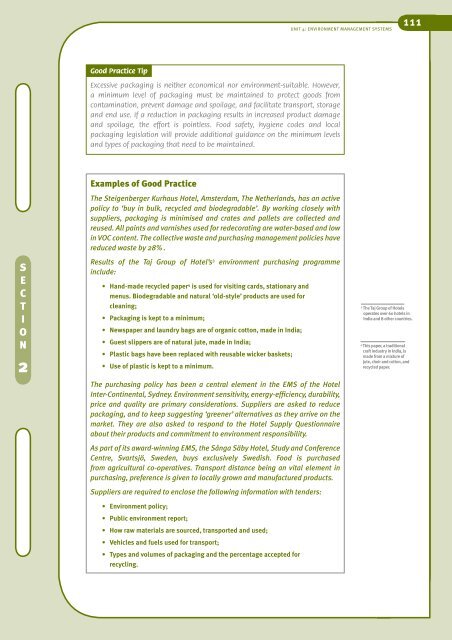Online version: PDF - DTIE
Online version: PDF - DTIE
Online version: PDF - DTIE
Create successful ePaper yourself
Turn your PDF publications into a flip-book with our unique Google optimized e-Paper software.
UNIT 4: ENVIRONMENT MANAGEMENT SYSTEMS<br />
111<br />
Good Practice Tip<br />
Excessive packaging is neither economical nor environment-suitable. However,<br />
a minimum level of packaging must be maintained to protect goods from<br />
contamination, prevent damage and spoilage, and facilitate transport, storage<br />
and end use. If a reduction in packaging results in increased product damage<br />
and spoilage, the effort is pointless. Food safety, hygiene codes and local<br />
packaging legislation will provide additional guidance on the minimum levels<br />
and types of packaging that need to be maintained.<br />
S<br />
E<br />
C<br />
T<br />
I<br />
O<br />
N<br />
2<br />
Examples of Good Practice<br />
The Steigenberger Kurhaus Hotel, Amsterdam, The Netherlands, has an active<br />
policy to ‘buy in bulk, recycled and biodegradable’. By working closely with<br />
suppliers, packaging is minimised and crates and pallets are collected and<br />
reused. All paints and varnishes used for redecorating are water-based and low<br />
in VOC content. The collective waste and purchasing management policies have<br />
reduced waste by 28%.<br />
Results of the Taj Group of Hotel’s 3 environment purchasing programme<br />
include:<br />
• Hand-made recycled paper 4 is used for visiting cards, stationary and<br />
menus. Biodegradable and natural ‘old-style’ products are used for<br />
cleaning;<br />
• Packaging is kept to a minimum;<br />
• Newspaper and laundry bags are of organic cotton, made in India;<br />
• Guest slippers are of natural jute, made in India;<br />
• Plastic bags have been replaced with reusable wicker baskets;<br />
• Use of plastic is kept to a minimum.<br />
The purchasing policy has been a central element in the EMS of the Hotel<br />
Inter-Continental, Sydney. Environment sensitivity, energy-efficiency, durability,<br />
price and quality are primary considerations. Suppliers are asked to reduce<br />
packaging, and to keep suggesting ‘greener’ alternatives as they arrive on the<br />
market. They are also asked to respond to the Hotel Supply Questionnaire<br />
about their products and commitment to environment responsibility.<br />
As part of its award-winning EMS, the Sånga Säby Hotel, Study and Conference<br />
Centre, Svartsjö, Sweden, buys exclusively Swedish. Food is purchased<br />
from agricultural co-operatives. Transport distance being an vital element in<br />
purchasing, preference is given to locally grown and manufactured products.<br />
Suppliers are required to enclose the following information with tenders:<br />
• Environment policy;<br />
• Public environment report;<br />
• How raw materials are sourced, transported and used;<br />
• Vehicles and fuels used for transport;<br />
• Types and volumes of packaging and the percentage accepted for<br />
recycling.<br />
3<br />
The Taj Group of Hotels<br />
operates over 60 hotels in<br />
India and 8 other countries.<br />
4<br />
This paper, a traditional<br />
craft industry in India, is<br />
made from a mixture of<br />
jute, choir and cotton, and<br />
recycled paper.
















